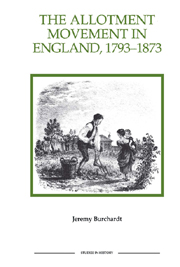Book contents
- Frontmatter
- Contents
- List of tables
- Acknowledgements
- Abbreviations
- Introduction
- PART I THE FIRST ALLOTMENT MOVEMENT
- PART II THE SECOND ALLOTMENT MOVEMENT
- PART III ALLOTMENTS AND RURAL SOCIETY
- 5 The allotment landlord
- 6 The allotment tenant
- 7 The social consequences of allotments
- PART IV TOWARDS THE THIRD ALLOTMENT MOVEMENT
- Conclusion
- 1 The allotments database
- 2 The origins and definition of allotments
- 3 Allotments and potato grounds
- 4 Legislative limits on plot size
- 5 Allotment plot size
- 6 Allotment rent
- 7 Animal-keeping on allotments
- 8 Allotment site rules
- Bibliography
- Index
7 - The social consequences of allotments
from PART III - ALLOTMENTS AND RURAL SOCIETY
Published online by Cambridge University Press: 12 September 2012
- Frontmatter
- Contents
- List of tables
- Acknowledgements
- Abbreviations
- Introduction
- PART I THE FIRST ALLOTMENT MOVEMENT
- PART II THE SECOND ALLOTMENT MOVEMENT
- PART III ALLOTMENTS AND RURAL SOCIETY
- 5 The allotment landlord
- 6 The allotment tenant
- 7 The social consequences of allotments
- PART IV TOWARDS THE THIRD ALLOTMENT MOVEMENT
- Conclusion
- 1 The allotments database
- 2 The origins and definition of allotments
- 3 Allotments and potato grounds
- 4 Legislative limits on plot size
- 5 Allotment plot size
- 6 Allotment rent
- 7 Animal-keeping on allotments
- 8 Allotment site rules
- Bibliography
- Index
Summary
Once we are aware of the strength of demand for allotments among rural workers for most of the nineteenth century, and of the very good reasons they had for wanting them, the importance of allotments to the individuals who rented them is manifest. But to assess the social consequences of allotment provision we need to know more about who these tenants actually were, and how adequate the provision of allotments was in proportion to the number of those who wanted to rent them.
In the mid-nineteenth century, allotments were generally seen as being provided for, and occupied by, agricultural labourers. It was no accident that the main organisation promoting allotments was entitled the Labourer's Friend Society; and even a cursory reading of any one of the society's publications is enough to make it clear that the labourer referred to was a field worker. Parliamentary committees and commissions from the great poor law inquiry of 1832–4 onwards similarly saw allotments as being essentially connected with agricultural labourers. Even as late as 1913, when the Land Enquiry Committee published its report on The land, political discussion of allotments was still focused almost entirely on the needs of the agricultural labourer. But as we saw in the last chapter, rural artisans and industrial workers also sometimes wanted to rent allotments, and on many sites – perhaps even a majority – agricultural labourers were not the only occupational group represented.
- Type
- Chapter
- Information
- The Allotment Movement in England, 1793–1873 , pp. 175 - 214Publisher: Boydell & BrewerPrint publication year: 2002

